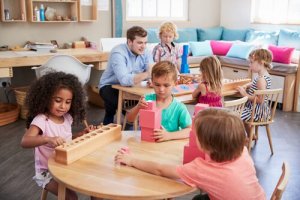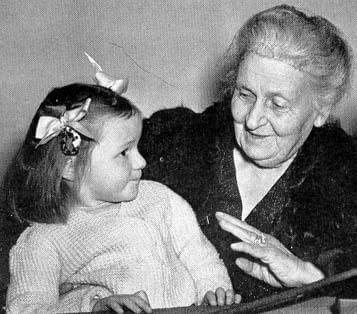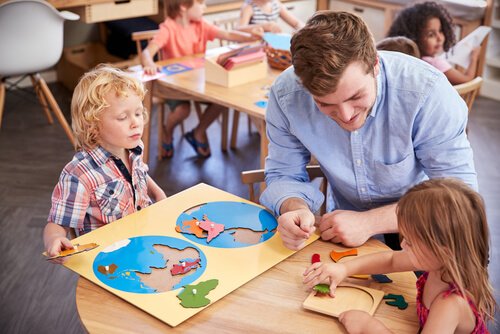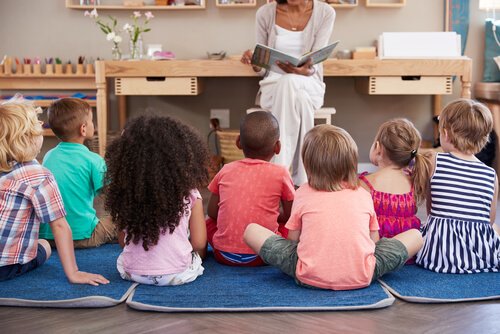Maria Montessori: The Woman Who Changed The World of Education

Maria Montessori was an Italian educator, scientist, doctor, psychiatrist, philosopher, anthropologist, biologist, and psychologist. With strong Catholic and feminist convictions, she graduated in 1896 as the first female doctor in Italy. She was contemporary with Sigmund Freud and developed her own classification of mental illnesses.
Between 1898 and 1900, she worked with children considered ‘mentally disturbed’. She realized that some simply had yet to develop their full potential. This gave rise to her vocation to study children’s capacities – which she did for 50 years.
Maria Montessori controversially stated that, during the first 3 years of life, learning is an effortless, natural process. Her method opposes the classical Prussian teaching method which arose due to the industrial revolution and was imposed throughout the West to this day. The latter method conceives children as future workers who will receive orders.
However, Maria Montessori conceived education in a different way. In this article, we’ll be talking about some of her most important ideas.
“The most important period of life is not the age of university studies, but the first one, the period from birth to the age of six.”
-Maria Montessori-

The Montessori Method of education
The Montessori Method of education is committed to making the most of the best stages of development. For this, it’s necessary to carefully prepare the environment and adapt it to the children’s physical characteristics.
This educational approach is committed to respecting children’s personal rhythms and styles. Some of the keys of Montessori education are: an interest in sensitive growth periods and the emphasis that children have an absorbing mind which they should take advantage of.
Here are some of the important components of the Montessori Method of education:
Components of the Montessori Method of education
Maria Montessori’s method is composed of keys that help facilitate children’s exploring and discovery processes. These keys help them develop naturally and encourage their autonomy. This is especially important up to age 3, which is when these components play an even more critical role.
“Early childhood education is the key to the betterment of society.”
-Maria Montessori-
Growing period
This method states that there are different types of psyches in different stages of life. These stages have different characteristics. In fact, developmental psychologists have studied them extensively.

Sensitive periods
These are stages where learning can be carried out in the simplest way possible. If the child doesn’t take the opportunity to learn, it’ll certainly be much more difficult for them to acquire certain knowledge or skills later on.
The absorbing mind
From childbirth up to age 3, the child hardly has memory or ability to reason. However, at this stage, the child is able to acquire plenty of knowledge since their brain is extremely sensitive. As we previously mentioned, Maria Montessori firmly believed that learning was a natural process.
Environment
All objects in the classroom must be useful, meaning that the educator must select them carefully beforehand. Students must be able to choose all kinds of tools and stimuli to ensure proper development.
“When children come into contact with nature, they reveal their strength.”
-Maria Montessori-
Freedom
Children have to have maximum freedom in the classroom. This stimulates their autonomy and desire to learn.
Structure and order
It’s vital that the class portrays structure and order. This allows each child to develop their own intelligence and mental order. The educator must order every single aid and material used in the classroom according to their level of difficulty.
Reality and nature
Maria Montessori stated that children should be encouraged to be in constant contact with nature. She believed this helps them understand and appreciate its order, harmony, and beauty. The ultimate goal is for them to understand natural laws, which are the foundation of all sciences.
Educators
According to Maria Montessori’s philosophy, educators play the role of facilitators during the learning process. In this educational method, their function is not to impart knowledge that children must memorize. On the contrary, it’s to give them the freedom and courage to explore their own interests.
In other words, educators must foster children’s desire to learn without interfering or hindering their individual processes. In short, being an educator is anything but easy.

The importance of corners according to Maria Montessori
Maria Montessori’s methodology supports the use of corners in the classroom. The goal of these spaces is to create a stimulating atmosphere where the children can develop their motor skills and psychological capacities.
The corner of the house
These refer to spaces full of each student’s personal objects. This classroom area must encourage organization and provide stability and order. In addition, having personal objects makes students feel safe.
Language corner
This space, full of mats and cushions, fosters the students’ speech. It’s important for this area to have bookshelves the children can select reading material from.
Sensation corner
This is the area of colors, sounds, touch, and coordination. This space can be decorated with musical instruments, multicolored cards, materials of different textures, and different toys. All of this stimuli promotes attention and sensitivity.
“Do not tell them how to do it. Show them how to do it and do not say a word. If you tell them they will watch your lips move. If you show them, they will want to do it themselves.”
-Maria Montessori-
[featured-post url=”https://exploringyourmind.com/education-foundation-good-life/”
Maria Montessori was an Italian educator, scientist, doctor, psychiatrist, philosopher, anthropologist, biologist, and psychologist. With strong Catholic and feminist convictions, she graduated in 1896 as the first female doctor in Italy. She was contemporary with Sigmund Freud and developed her own classification of mental illnesses.
Between 1898 and 1900, she worked with children considered ‘mentally disturbed’. She realized that some simply had yet to develop their full potential. This gave rise to her vocation to study children’s capacities – which she did for 50 years.
Maria Montessori controversially stated that, during the first 3 years of life, learning is an effortless, natural process. Her method opposes the classical Prussian teaching method which arose due to the industrial revolution and was imposed throughout the West to this day. The latter method conceives children as future workers who will receive orders.
However, Maria Montessori conceived education in a different way. In this article, we’ll be talking about some of her most important ideas.
“The most important period of life is not the age of university studies, but the first one, the period from birth to the age of six.”
-Maria Montessori-

The Montessori Method of education
The Montessori Method of education is committed to making the most of the best stages of development. For this, it’s necessary to carefully prepare the environment and adapt it to the children’s physical characteristics.
This educational approach is committed to respecting children’s personal rhythms and styles. Some of the keys of Montessori education are: an interest in sensitive growth periods and the emphasis that children have an absorbing mind which they should take advantage of.
Here are some of the important components of the Montessori Method of education:
Components of the Montessori Method of education
Maria Montessori’s method is composed of keys that help facilitate children’s exploring and discovery processes. These keys help them develop naturally and encourage their autonomy. This is especially important up to age 3, which is when these components play an even more critical role.
“Early childhood education is the key to the betterment of society.”
-Maria Montessori-
Growing period
This method states that there are different types of psyches in different stages of life. These stages have different characteristics. In fact, developmental psychologists have studied them extensively.

Sensitive periods
These are stages where learning can be carried out in the simplest way possible. If the child doesn’t take the opportunity to learn, it’ll certainly be much more difficult for them to acquire certain knowledge or skills later on.
The absorbing mind
From childbirth up to age 3, the child hardly has memory or ability to reason. However, at this stage, the child is able to acquire plenty of knowledge since their brain is extremely sensitive. As we previously mentioned, Maria Montessori firmly believed that learning was a natural process.
Environment
All objects in the classroom must be useful, meaning that the educator must select them carefully beforehand. Students must be able to choose all kinds of tools and stimuli to ensure proper development.
“When children come into contact with nature, they reveal their strength.”
-Maria Montessori-
Freedom
Children have to have maximum freedom in the classroom. This stimulates their autonomy and desire to learn.
Structure and order
It’s vital that the class portrays structure and order. This allows each child to develop their own intelligence and mental order. The educator must order every single aid and material used in the classroom according to their level of difficulty.
Reality and nature
Maria Montessori stated that children should be encouraged to be in constant contact with nature. She believed this helps them understand and appreciate its order, harmony, and beauty. The ultimate goal is for them to understand natural laws, which are the foundation of all sciences.
Educators
According to Maria Montessori’s philosophy, educators play the role of facilitators during the learning process. In this educational method, their function is not to impart knowledge that children must memorize. On the contrary, it’s to give them the freedom and courage to explore their own interests.
In other words, educators must foster children’s desire to learn without interfering or hindering their individual processes. In short, being an educator is anything but easy.

The importance of corners according to Maria Montessori
Maria Montessori’s methodology supports the use of corners in the classroom. The goal of these spaces is to create a stimulating atmosphere where the children can develop their motor skills and psychological capacities.
The corner of the house
These refer to spaces full of each student’s personal objects. This classroom area must encourage organization and provide stability and order. In addition, having personal objects makes students feel safe.
Language corner
This space, full of mats and cushions, fosters the students’ speech. It’s important for this area to have bookshelves the children can select reading material from.
Sensation corner
This is the area of colors, sounds, touch, and coordination. This space can be decorated with musical instruments, multicolored cards, materials of different textures, and different toys. All of this stimuli promotes attention and sensitivity.
“Do not tell them how to do it. Show them how to do it and do not say a word. If you tell them they will watch your lips move. If you show them, they will want to do it themselves.”
-Maria Montessori-
[featured-post url=”https://exploringyourmind.com/education-foundation-good-life/”
This text is provided for informational purposes only and does not replace consultation with a professional. If in doubt, consult your specialist.







